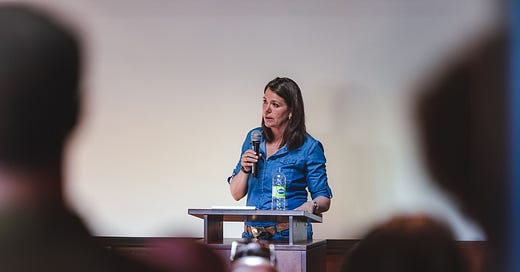Karamveer Lalh: Danielle Smith is a Conservative
Factions within the conservative movement are largely united in opposition to a particular and specific conception of Canada: the "progressive" one.
By: Karamveer Lalh
About a year ago, in an article for The Hub, I tried to offer a basic classification of the types of conservative thought. I will not rehash my argument in that piece. Still, as a high-level sketch of that argument, I suggested that there are at least three distinct types of conservatives in Canada: Populists focus on representing the will of ordinary people, which often emphasizes nationalism and cultural identity. Libertarians prioritize individual liberty and limited government intervention, while Burkeans advocate for gradual change rooted in tradition and accumulated wisdom.
In the piece published by The Line, written by Jared Wesley and Ken Boessenkool, the authors suggest that Danielle Smith is not a conservative but is instead a “libertarian populist.” I believe this claim is odd because, by Wesley and Boessenkool’s definition, Smith would still fit squarely within the meaning of “conservative” that I offered. Instead, Wesley and Boessenkool suggest that a proper “conservative” aligns with Michael Oakeshott’s (what I would call a Burkean) understanding of conservatism.
Jared Wesley and Ken Boessenkool: Danielle Smith is not a conservative
To be conservative … is to prefer the familiar to the unknown, to prefer the tried to the untried, fact to mystery, the actual to the possible, the limited to the unbounded, the near to the distant, the sufficient to the superabundant, the convenient to the perfect, present laughter to utopian bliss.
Though it does have some merit, this view is grounded in theory rather than history. For example, it is challenging to categorize a premier like Ralph Klein as anything other than a “libertarian populist.” Consequently, I find their portrayal of Alberta’s political culture — which has never been consistently incrementalist — somewhat misguided.
In light of the above debate, it’s worth considering what unites the disparate conservative factions. These factions can find common ground on several key issues despite their differences. For instance, they generally share a skepticism of centralized power and a preference for local governance. Additionally, they often agree on the importance of personal responsibility, self-reliance and the free market as key drivers of prosperity. But most importantly, I’d suggest that the factions within the conservative movement are largely united in opposition to a particular and specific conception of Canada. Let us call it the “progressive” concept.
This progressive vision sees Canada as a peaceful, friendly and multicultural society with roots in British and French settler colonies that expanded across Indigenous territories in North America. Canada faces numerous challenges today, including reconciliation with Indigenous peoples and combating climate change.
The “conservative” conception remains less well-defined, particularly at the federal level. However, provincially, Danielle Smith offers a clear vision of Alberta’s narrative, which resonates with many Albertans: Alberta has long been overshadowed by central Canada’s power centres, catering to the whims of the Laurentian elite. This prosperous, freedom-loving province has thrived by harnessing its natural resources and talents, only to be met with resentment and punishment from the envious power brokers in the Windsor–Quebec City corridor. This story of Alberta is immensely popular with Albertans; most Albertans see it as our story. Accordingly, that is a story and a narrative worth conserving because it is ours.
Implicit in both types of stories, the general “progressive” conception and the more conservative “Albertan” conception, is two distinct visions of Alberta and the country in general. What makes a conservative is not a particular ideological commitment or even tone; it is a particular relationship to the narrative of a people. Federal conservatives need to defend the idea that Canada is good, and where it is going is also good; whereas the progressive narrative suggests that Canada needs to change in order to be good (or, at least, better).
In essence, the distinctness in the conservative and the progressive conceptions have a particular relationship to where we are now and where we are going: they diverge in their perspectives on the present and the future, and if they were vectors, they would point in different directions.
Danielle Smith accordingly does have a narrative for Alberta that is conservative in the sense that she supports conserving the particular conception and understanding of Alberta as a freedom-loving people. Her relationship to that narrative is arguably what makes her a conservative.
Karamveer Lalh is a lawyer with an Edmonton-area law firm.
The Line is Canada’s last, best hope for irreverent commentary. We reject bullshit. We love lively writing. Please consider supporting us by subscribing. Follow us on Twitter @the_lineca. Pitch us something: lineeditor@protonmail.com




